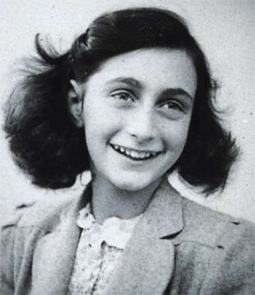
For those not familiar with Anne Frank’s life and story, Anne was an inquisitive Jewish girl who lived in Holland during the time of Adolf Hitler’s reign of power. Under this new Nazi regime, Jewish people throughout many parts of Europe were subsequently stripped of nearly all of their human rights and freedoms. The Diary of Anne Frank tells this story from the point of view of one extraordinary and articulate young girl.
In her world famous Diary, which she scribed from 1942 through 1944, Anne Frank chronicles her life from age thirteen through fifteen. She pours out her feelings and insights from the perspective of a teenage girl who is emerging into womanhood. Simultaneously, Anne divulges the indignities which she and her family suffered at the hands of the Nazi party as this political party continued to gain prominence throughout Holland. Anne speaks of not being allowed to go out in public without a prominent yellow Star of David sewn onto her clothing, and of only being able to attend “Jewish” schools or patronize stores which bared the placard “Jewish Shop.” Anne Frank also details in her Diary Jews not being able to stay outside after 8pm or even enjoy simple entertainment such as theatre and cinema. As Anne Frank sums it up in her own words, “So we could not do this and were forbidden to do that. But life went on in spite of it all.” She still spent much of her time exploring many of the same issues that concern teenage girls the world over: puberty, her budding womanhood and a tentative interest in boys.
Anne’s Diary travels with her as her father Otto Frank puts the family into hiding in what is now referred to as the “Secret Annexe,” which sat above a warehouse. It was there that the family hid out for two years, temporarily sheltered from the fate of many Jewish people who were rounded up and transported to concentration camps. The Franks subsisted with the assistance of Christian friends who risked the possibility of their own arrest and execution by the Nazis if they were caught hiding the Frank family. In Anne Frank’s native Dutch language, the area in which the family hid was referred to as “Achterhuis” which in Dutch means “In Back of House.” This was later translated into the English interpretation “Secret Annexe.” It was during this time when Anne wrote feverishly in her Diary: about the bond she shared with her father; about butting heads with her mother Edith and sister Margot; and developing feelings for a boy named Peter, whose family was also hiding in the Annexe, in rather close quarters with the Frank family. Perhaps most importantly, it was during these journal entries that Anne attempted to make some sense out of the unspeakable cruelties and inhumane treatment that she and other Jewish people were forced to endure.
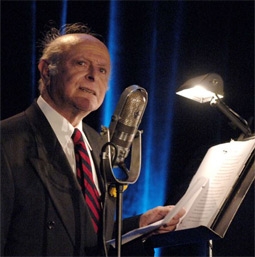
Anne’s last Diary entry was on Tuesday, August 1, 1944. A few days later, after an unknown informant alerted the Nazi Gestapo to their whereabouts, Anne Frank was arrested and taken to Gestapo headquarters in Amsterdam. She was then sent on to Auschwitz. Hers was the very last train to leave for Auschwitz, as the Allies were already invading Nazi territories throughout Europe. Anne Frank’s Diary is a human testimonial, documenting not just the horrors of the Holocaust from a young girl’s perspective, but a testimonial to the resilience of the human spirit which was so self-evident in this young girl. Her Diary displays a perspective and wisdom far beyond her years on Earth. Although Anne could not have predicted the enormous impact that her Diary would have around the world, she inarguably possessed an innate understanding of her life’s purpose. In her own words she writes, “I want to go on living even after my death! And therefore I am grateful to God for giving me this gift, this possibility of developing myself and of writing, of expressing all that is in me.”
I recently had the extreme privilege of speaking with Mr. Bernhard “Buddy” Elias who is Anne Frank’s first cousin, as well as her last living direct relative. For this reason, I believe that Buddy Elias is a walking, breathing monument of human history. Unlike most interviews I have done, I literally have no memory of how I came to find Mr. Elias or what originally prompted me to seek him out. My memory only begins with our initial correspondence. In researching Buddy Elias’s life I learned that his birthday is June 2nd, which is the same day as my beloved late Grandfather’s birthday. I knew then that we were meant to do this interview.
Buddy Elias now holds the position of Chairman of the Board of the ANNE FRANK-Fonds which is located in Basel, Switzerland and overseas all copyrights and projects associated with Anne Frank’s Diary. In explaining the importance of protecting and preserving his cousin’s legacy through the ANNE FRANK-Fonds, Mr. Elias explains “Through her Diary, Anne Frank has become a world wide symbol, representing all victims of racism, anti-Semitism and fascism. She stands for victims who lived at the same time as she did just as much as for the victims of today. The foremost message contained in her Diary sets out to combat all forms of racism and anti-Semitism.” Anne Frank: The Diary of a Young Girl has been translated into 54 languages and has sold more than 25 million copies worldwide. Numerous stage productions and films have been adapted from the book over the years.
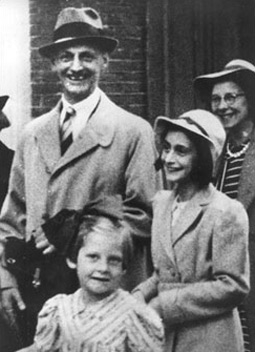
In this rare interview, Buddy Elias recalls fond memories with his first cousin, including some never before heard humorous childhood anecdotes, which highlight Anne Frank’s wit and playfulness. You will also read in his first hand account, Buddy Elias’s reaction to reading Anne’s diary for the first time and how he and his family came to discover Anne’s whereabouts during and after World War II.
*Although some of the grammar throughout this interview is not perfect – Mr. Elias is Swiss, and English is not his first language – I felt it important to keep much of his original wording for the purpose of preserving the integrity of Mr. Elias’s sentiments.
PR.com (Allison Kugel): Being that your mother and Anne Frank's father, Otto Frank, were brother and sister and you and Anne first cousins, I imagine you spent quite a bit of your early childhood together. Can you tell me what you remember about Anne Frank’s personality, her sense of humor, and things she enjoyed as a young girl?
Buddy Elias: Anne explains her character best in her Diary, but my memories of her are all positive, as we were very fond of each other. Margot, her sister, was more my age. Anne was my playmate whenever we were together. Margot was a reader, and not so playful as Anne. Anne and I were two really wild kids. She always knew what to play, and getting dressed up and playing actors was one of her favorite games. I had a puppet theatre and the last time we were together I had a grandmother puppet, a crocodile [puppet] and a Jack in the Box. I handled the puppets. The crocodile wanted to eat grandmother, but Jack came up and killed the crocodile. Anne loved that! Then she told me to put on a dress of our real grandmother, Otto's and my mother's mother, and a hat and her high heeled shoes and imitate her, which I did. Anne had a wonderful laugh. She was a very happy and playful girl. She could get angry too, of course. Reasons every child gets angry; not getting what she would like. With her it was always fun. That was our last meeting before the war. It must have been 1938.
PR.com: Why did Anne call you "Bernd" as opposed to Bernhard or Buddy as most people called you?
Buddy Elias: That I cannot tell you. I only know that she didn’t like Buddy, the name my brother gave me. Bernd was probably a short version of Bernhard.
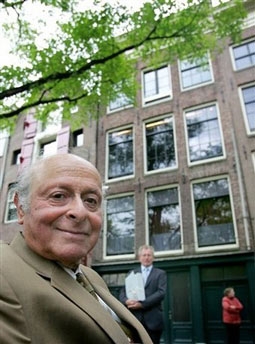
PR.com: Do you remember what kind of bond Anne Frank shared with her father, Otto Frank, and what type of relationship she shared with your mother who was her aunt?
Buddy Elias: Anne was Otto's child, while Margot took more to her mother. Anne was also very fond of my mother, her aunt.
PR.com: Before the war, what kind of work did your parents do and what kind of work did Otto Frank do?
Buddy Elias: My father became representative of a German firm in Switzerland before Hitler came to power. He moved in 1929, and my mother and me followed in 1931. That saved us. My father was a merchant, but worked also as a banker in Otto Frank’s father’s bank while he was still in Germany. Otto worked also at the bank of his father, but studied some time in Heidelberg, where he met Nathan Strauss of the famous American Strauss family [who owns] Macy’s. They became friends and Otto spent some time in New York working at Macy’s. When Otto had to leave Germany due to Hitler, my father arranged for him to become the representative in Holland of the same firm my father worked for, called Opekta.
PR.com: You have mentioned a joint family trip to the Swiss Alps as your last memory of Anne. Can you tell me a little bit about that trip, anything you remember Anne saying to you and any mention by Anne, or the rest of the family of the problems they were facing in Germany at the time?
Buddy Elias: We were in Sils-Maria at the Villa of distant relatives of our family. I cannot remember any details. We were just kids having a good time and enjoying the lovely scenery, and being spoiled by the owner of the Villa who was very rich. The Franks were already living in Holland and had no problems there at that time.
PR.com: Being that you were now residing in Switzerland when Germany was taken over by the Nazi party, did you, your brother or your parents experience any discrimination, or were you at all subjected to any threats whatsoever?
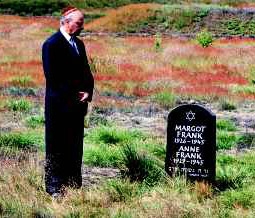
Buddy Elias: Until the war broke out we lived a most pleasant life in Switzerland. Naturally, anti-Semitism was also present here, but it was not threatening or dangerous. It changed when war broke out. We were never sure that the German army would not invade Switzerland, and we were always afraid. Of course I experienced anti-Semitism in school, but not too often or too badly. Discriminated we were in so far, as we tried to become Swiss citizens, but that was impossible for Jews then. Only if they had a lot of money it was possible. The [Swiss] population was largely in favor of the Allies, but a minority [was] for Hitler, and one of the highest men in the Swiss government was responsible for German Jews to get the letter "J" put in their passport.
PR.com: Do you recall why Otto Frank didn't move the family to Switzerland as well, in order to escape persecution by the Nazis?
Buddy Elias: Otto Frank chose Holland, as he had worked there as a young man already. He liked Amsterdam, and of course did not know at that time what would happen.
PR.com: Did you receive any correspondence from Anne during the time when her home had grown tense, and Jewish people were losing their rights? And did you and your parents receive any correspondence from Anne or the rest of the family informing you that they were planning to go into hiding?
Buddy Elias: When the Franks left Germany, Anne was only 4 years old and could not write yet. On July 5th 1942 Otto Frank sent a postcard to us telling us that we would have to understand, that we could not correspond anymore. We knew then, that they were going to hide. But we had no idea where. And from then on there was no contact anymore, except my father corresponding with one of Otto's employees, but strictly on business. But from the time when Anne went to school in Holland and learned to write, she sent many letters to us. They are all preserved and in the archive of the [Anne Frank] Museum in Amsterdam. I have copies. Before they went into hiding, Otto had tried to escape to the U.S. or to Cuba. The Strauss family did all they could to make it possible, but unfortunately it was impossible.
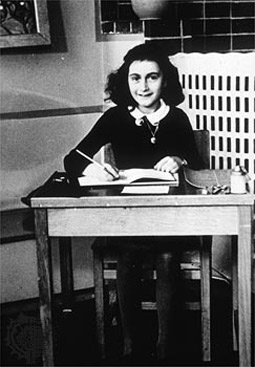
PR.com: Was Anne a good student in school, and did she always demonstrate a flare for writing and language? Did she always keep a journal even before the war?
Buddy Elias: Margot was brilliant in school, Anne not so. She loved history and writing stories, and hated mathematics. Yes, she always wrote letters or anything she felt like writing. She also wrote essays and short stories while in hiding. But she did not start her diary until her 13th birthday, which was one month before they went into hiding.
PR.com: What did Anne talk about wanting to be when she grew up? What were her dreams?
Buddy Elias: As a small child, as most kids that age, she wanted to become a movie star. Later she wanted to be a journalist or author.
PR.com: How did you get word that she and her family were arrested and sent to Auschwitz? And when did you finally find out about their whereabouts and that Otto Frank was the only survivor?
Buddy Elias: We were not informed about their arrest. The first we heard after the war was a telegram we received from The Red Cross telling us, "We'll arrive soon in Marseille in good health. Otto." We thought it would be the whole family, but Otto had to inform us that he was alone. He had heard on the way back that his wife (Edith Frank) had perished, but he had great hopes to be reunited with his children. He found out one month later that Margot and Anne perished in Bergen-Belsen.
PR.com: What did Otto Frank express to you about his reasons for wanting to publish his daughter’s diary, and to share it with the world?
Buddy Elias: Otto at first did not want to have Anne’s diary published. But then he remembered that it was Anne's dream that something she had written would maybe sometime, somewhere be printed. So, he wanted to fulfill Anne's hopes and dreams. The Diary of Anne Frank was first published in Holland, summer 1947. 1500 copies (the amount of copies for the very first printing of the book).
PR.com: What about Anne Frank do you think is most crucial for the world to know about her and her life?
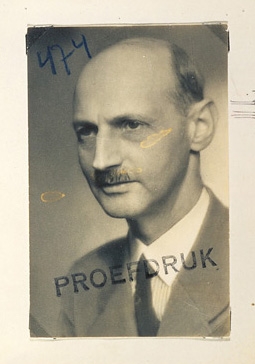
Buddy Elias: She gave the Holocaust a name. You can ask the world over, “Can you name one victim of the Holocaust by name?” And everybody will say, "Yes, Anne Frank." Besides, she has written a most humanistic and unforgettable book in a wisdom you can rarely find in a child of that age. "Once we will be human beings again, and not just Jews." She has taken a stand for the rights for women. She hoped that humanity could sometime live in peace, no matter what religion, nationality or color of skin. Especially young people can identify with Anne Frank the world over. On a lecture tour in Japan I witnessed incredible love all over for her. There exists a rose [named] after Anne Frank. This flower is planted all over Japan as a sign of peace. There exists even a Christian church called the "Anne Frank Rose Church." And in Fukuyama, a Holocaust Museum is dedicated mainly to Otto Frank and Anne Frank.
PR.com: When did you take over The Anne Frank Foundation as Chairman? And what is the mission of the foundation going forward in the 21st century?
Buddy Elias: I became chairman of the ANNE FRANK-Fonds, not the Foundation, which is in Amsterdam, in 1996. The purpose of the ANNE FRANK-Fonds is to promote charitable work and to play a social and cultural role in the spirit of Anne Frank. It was a particular wish of Otto Frank that the ANNE FRANK-Fonds should contribute to a better understanding between religions, to serve the cause of peace between people, and to encourage international contacts between the young. The money that the Fonds earns through the book sale, theater, film etc. is being donated charitably in the ideals of Anne Frank and Otto Frank.
PR.com: Was Otto Frank the originator of the ANNE FRANK-Fonds? And did you have the opportunity to work in conjunction with your uncle in preserving Anne's memory before his passing?
Buddy Elias: Yes, Otto was the founder of the Fonds. I was able to work for the Fonds already before his passing, but not as intensively, because I was living in Germany most of the time. I returned to Basel in 1986. From then on I had two ideals: my work as an actor and my work for the Anne Frank Fonds.
PR.com: What are your thoughts on some of the plays that have been adapted from Anne's diary? Have you seen any theatrical adaptations of the book?
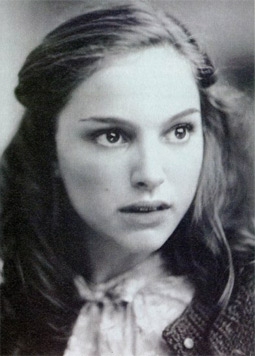
Buddy Elias: There are not so many stage versions of the book. I saw quite many stagings. Some I liked, some not so much. I saw the stage production in the 50th in New York where I was out after the performance with Joseph Schildkraut who played Otto [Frank], and the last staging with Natalie Portman as Anne. Natalie and her parents visited us in Basel when I mediated the 100 year memorial of Herzel, the event in Basel. The BBC London just produced 5 episodes out of The Diary [of Anne Frank]. They will be shown in September. I saw a preview and it is the best Anne Frank production I ever saw.
PR.com: Upon reading Anne's diary, what did you think about the stories she wrote in it about her relationship with you? And when did you get to read her diary for the first time?
Buddy Elias: I was moved to tears when I read her diary for the first time, and what she wrote about me. It was when Otto translated it into German and sent chapter after chapter to us in Switzerland. I didn’t recognize my funny playmate anymore. Otto always said, "I didn’t know my daughter until I read her diary."
PR.com: After all that your family experienced and lost during the war (during the Nazi Holocaust), how do you feel about your Jewish heritage, and what are your thoughts on religion?
Buddy Elias: I feel very much Jewish-ethnically, but I am not religious. Religion has always separated humanity, never united it. Billions had to die because of religion everywhere. There are more than 2000 religious denominations in the world and each one is sure to have the truth. I don't like it. I have my own believe, just for myself. You could call it Humanism.
PR.com: How soon after WWII did you begin your acting career in Europe? And what made you want to skate as well?
Buddy Elias: I started skating at age 4, and as I was very agile and had a good sense of humor, when I was 14 I started doing comedy on ice with a friend. We gave exhibitions in Switzerland already during the war. After my schooling I went to drama school and started my career as an actor in Switzerland. But, I still did skating whenever I had the time. My partner went to England on business and came in contact with the producer of English ice shows, who offered us a contract. We accepted. Thus, I started my career as an ice comedian which lasted 14 years, mostly with Holiday On Ice. We toured the whole world; the Bolshoi Ballet, to the U.S. and we in Moscow with special performance for Chruschtschow. In 1961 I quit and returned to acting. I was very lucky and played many leading roles at some of German's most renowned theatres in Berlin, Hamburg, Bremen and Stuttgart. I also played musicals, [including] one leading part at the Shaftesbury theatre in London (Canterbury Tales), as well a part in "La belle Helène" at the festivals in Aix en Provence and Salzburg in French. Besides I was cast in many television productions in Germany. Right now I am performing in a comedy at a Basel theatre, but we will have our last performances soon. I already signed for a production at this theatre for next winter. Television offers are coming along too, but right at the moment I have no such plans. I am still active on stage and TV, but my life and work is mostly for Anne Frank and the Fonds. Quite often I go to schools and lecture about Anne and the Holocaust.
PR.com: What is your life like today in Switzerland? Do you have a family?
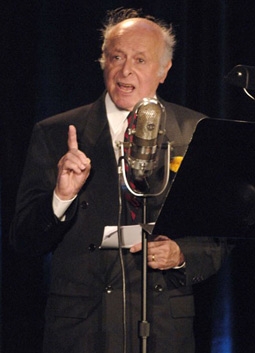
Buddy Elias: I have a wife who is an angel. We are married for 43 years now. We have different opinions sometimes, but we never fight. I met her at the theatre, where she was an actress. She is very spiritual, but not religious. We love each other today as 43 years ago. We have two sons, Patrick who is 42 and Oliver who is 36. Patrick is an actor and played one of the leads for two years in "The Lion King" in Hamburg. He also studied NLP and is a terrific coach. He is married and has 4 children by two wives. Oliver, who lives in Berlin, is an author and actor. He writes for German TV. He is engaged to a medical student. I love living in Switzerland, although not everything is perfect. Basel is a good place to live, a very cultured town. With my car, I am in 5 minutes in France and in 10 minutes in Germany. Good for shopping.
PR.com: How do you see your responsibility as Anne Frank’s last living relative, as far as preserving her memory and her legacy?
Buddy Elias: The least I can do to have been spared the terrible destiny of Anne, Margot, Edith and 6 million others is to live and work for Anne's humanistic ideals: to work for peace and against discrimination in any form in the small way I am able to.
About The ANNE FRANK-Fonds in Buddy Elias’s Own Words:
“The ANNE FRANK-Fonds in Basel uses its significant proportion of the revenue from the Fond’s assets for a wide range of charitable activities. Support is given to projects that have been carefully examined by the board of trustees.
“In cooperation with Yad Vashem in Jerusalem the AFF founded the ‘Anne Frank Medical Fund for the Righteous.’ This provides urgently needed medical supplies to the "righteous" non-Jews who risked their [own] lives to help Jews [who were] persecuted during the Holocaust. Help with financing is also sought from third parties. Support is given to Israeli - Palestinian peace organizations. Encouragement of projects related to schools and education. Support also to the ANNE FRANK House in Amsterdam, and to their sister organizations in Berlin, London and New York.”
The proprietor of all rights, and the copyright, to "The Diaries of Anne Frank" is the ANNE FRANK-Fonds (AFF), based in Basel. The Fonds is run by Buddy Elias. For more information and to learn more about Anne Frank’s story and The ANNE FRANK-Fonds (AFF), please visit www.annefrank.ch.
